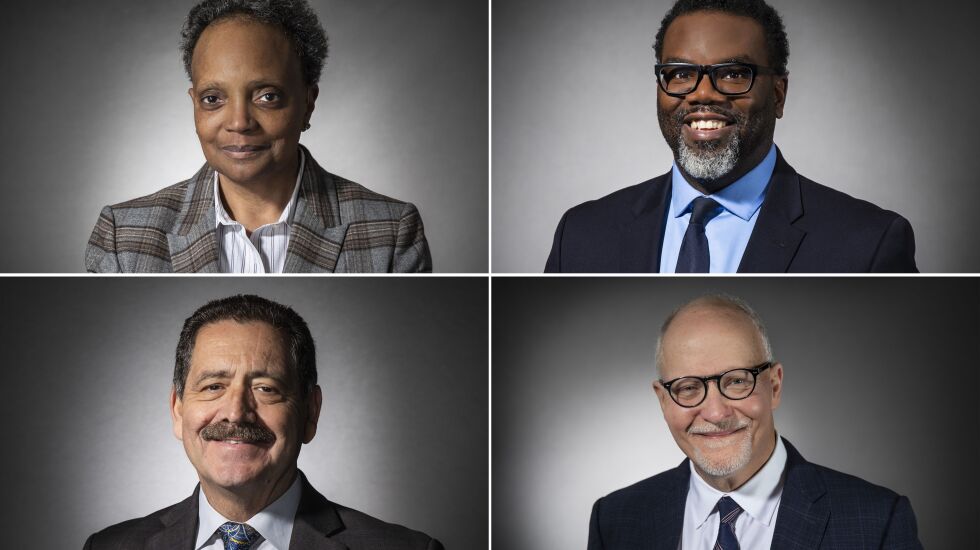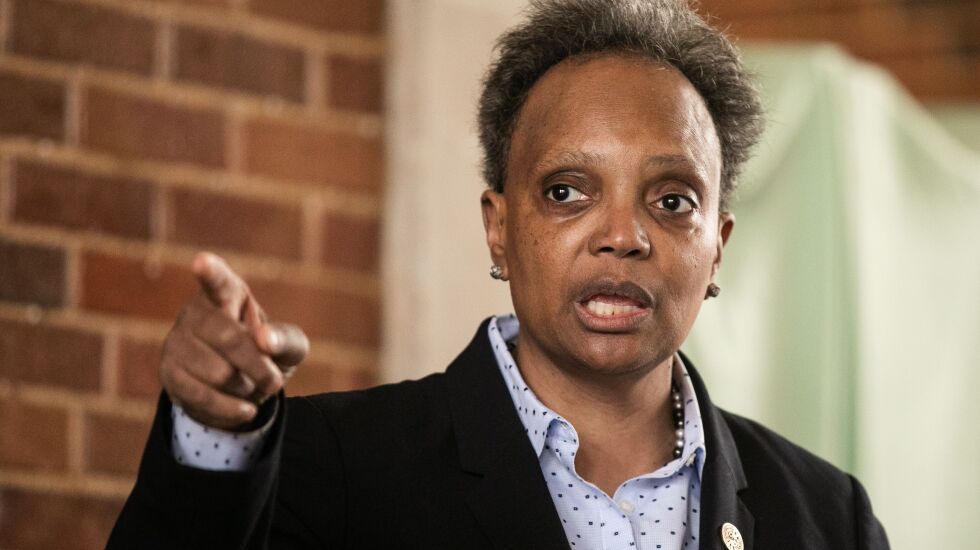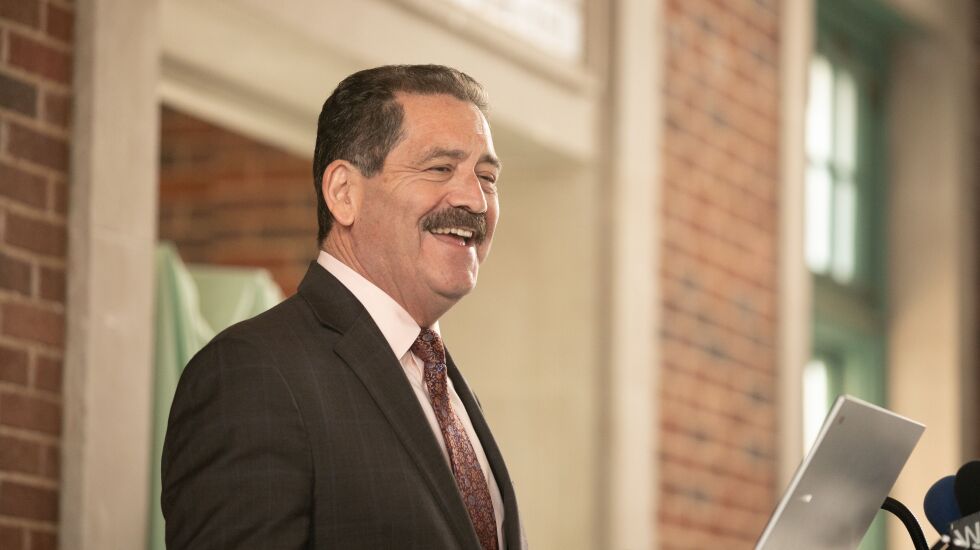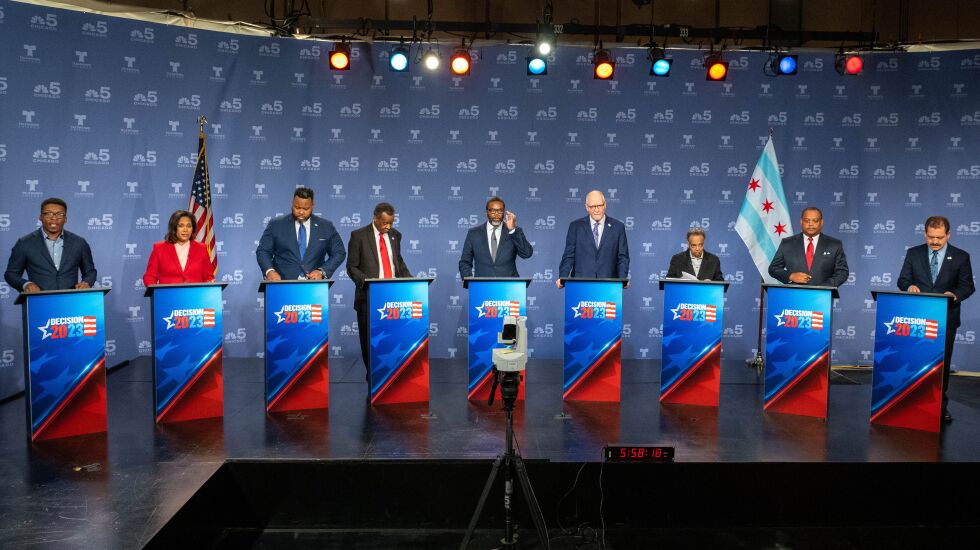
Internal and external polling in the red-hot race for mayor of Chicago has been all over the map, but the polls agree on one thing: Only four of the nine candidates have a real shot at making the April 4 runoff.
Former Chicago Public Schools CEO Paul Vallas is likely to be one of the runoff contenders based on those polls. The second slot is up for grabs between incumbent Mayor Lori Lightfoot, U.S. Rep. Jesus “Chuy” Garcia and a surging Cook County Commissioner Brandon Johnson.
Turnout is likely to be about the same as the 35.5% of the electorate who cast first-round ballots in 2019, when 14 candidates were on the ballot. Lightfoot came seemingly out of nowhere to finish first, with 17.5%, setting up a runoff with County Board President Toni Preckwinkle.
If the vote total is close to the 556,758 ballots cast last time, the top two are likely to exceed 20% of that — roughly 111,351 votes.
The four top-polling candidates have different formulas to reach that benchmark and punch their ticket to the runoff.
The Sun-Times talked to campaign managers and political strategists for the final four — along with several other veteran political observers — to get their take on what each of the candidates needs to make it to Round 2.
Paul Vallas
In a field including seven Black candidates and one Hispanic, there appears to be no stopping Vallas, the only white mayoral candidate. He’s hammered on his law-and-order message, raised a surprising $5.1 million and outspent everyone but self-funded millionaire businessman Willie Wilson.
Vallas’ political base is made up of the white ethnic wards on the Northwest and Southwest sides, home to scores of police officers and firefighters. Those wards routinely produce the highest voter turnouts in Chicago.
That includes the 19th Ward, where 2019 mayoral challenger Jerry Joyce and his father, former state Sen. Jeremiah Joyce, both live. In 2019’s first round, 21,344 votes for mayor were cast in the 19th — more than any other ward.
The Far Northwest Side’s 41st Ward, where local Ald. Anthony Napolitano has endorsed Vallas, was No. 3 in 2019, with 17,924 mayoral votes.
If Vallas racks up big totals in some of those wards, he needs only a piece of the downtown and north lakefront vote to reach the runoff.
That should be a cakewalk for Vallas, who has endorsements from Ald. Brian Hopkins (2nd) and Ald. Brendan Reilly (44th), both representing downtown. He’s also backed by retiring Ald. Tom Tunney (44th), Chicago’s first openly gay alderperson and one of at least seven members of Lightfoot’s City Council leadership team to abandon ship. Voters in all three of those wards have grown disenchanted with Lightfoot amid surging violent crime along the lakefront and downtown and a reduction in police officers in their local police districts.
“Lori has been attacking anything that moves. Chuy has run a relatively weak campaign in terms of any message. The rest of the field has been attacking each other. We feel pretty good about our message and where Paul is,” said veteran political operative Joe Trippi, Vallas’ chief strategist.
“This campaign has been laser-focused on making sure voters understand that crime and their safety is Paul Vallas’ top priority. No matter how much crap and b.s. has been thrown his way, we’ve stayed disciplined and on message. It’s why he’s raised more money than he ever has,” said Trippi.
Lori Lightfoot
The first openly gay person and second woman to serve as mayor of Chicago is fighting for her political life after a tumultuous four year-term dominated by the pandemic, civil unrest, crime and squabbles with the Chicago Teachers Union, including an 11-day strike.
Lightfoot’s path to the runoff goes through the Black community, though six other Black candidates are in her way. Wilson captured 13 of 18 Black wards in 2019 and has further endeared himself since then with a string gasoline, food and cash giveaways.

To punch her ticket to Round 2, Lightfoot needs Johnson to underperform in majority-Black wards and both Johnson and Garcia to disappoint in progressive lakefront wards like the 44th, 46th, 48th, 49th and adjacent wards like the 33rd, 35th and 47th.
No wonder Lightfoot recently warned a South Side crowd a vote for “somebody not named Lightfoot is a vote for Chuy Garcia or Paul Vallas. ... If you want them controlling your fate and your destiny, then stay home. Then don’t vote.”
“She’s put all her chips down on the Black vote. She needs more Black votes, and she’ll do whatever it takes” to get them, said veteran political operative Victor Reyes, who supports Garcia, but said he is not working for him or any other mayoral candidate.
“They know they’ve lost the Latino vote. They’re in bad shape with lakefront voters. ... And they won’t get the Northwest or Southwest sides. Her only path is to try to squeeze out points in the Black community and be the leading vote-getter in those wards. If she doesn’t get 30% of the Black vote, it will be very difficult for her to make the runoff.”
Lightfoot campaign manager Valerie Martin said their internal polling “consistently shows us with a strong and firm base” along the lakefront with “hundreds and hundreds of volunteers from faith and labor organizations” poised to turn out Lightfoot’s vote on Election Day.
Martin noted Lightfoot was the “first to go up on television,” has “stayed on TV” throughout the campaign and has papered the town with “hundreds of thousands of pieces of direct mail touting the mayor’s accomplishments among specific groups of voters,” including women, LGBTQ+ voters and long-neglected residents of the South and West sides.
“We believe there is something for everyone in terms of how this mayor has delivered,” Martin said, including the $15-an-hour minimum wage, providing a “safe haven for abortion” and making “historic investments” through her Invest South/West plan.
Martin wouldn’t offer specific percentages needed to put Lightfoot in the runoff.
The mayor “is “competing in every corner of the city among every demographic,” Martin told the Sun-Times.
“Our polling has consistently shown us in the top spot, with a lot of movement from other candidates,” she added. “But this is not the first time that this mayor has been counted out. She’s unfortunately used to that. And she’s not afraid of being the underdog. We have every confidence that she is going to beat the naysayers yet again.”
Lightfoot owes her election to the corruption scandal still swirling around indicted and now-retiring Ald. Edward Burke (14th).
She was languishing in the single digits until Jan. 3, 2019, when the first round of federal charges were filed against Burke. Then came news of a $10,000 contribution to Preckwinkle that Burke is accused of muscling from a Burger King franchise owner in his ward.
Lightfoot finished first, then swept all 50 wards in the runoff.
This time, lakefront voters who had took a chance on Lightfoot because she had no ties to Burke are more concerned about violent crime. Now, many political observers say, they’ve grown disenchanted with Lightfoot for breaking several campaign promises and not running as transparent an administration as promised.
Jesus ‘Chuy’ Garcia
As the only Hispanic candidate, Garcia goes into Tuesday’s election in a position of strength, though in a recent poll done for Northwestern University’s Center for the Study of Diversity and Democracy, 69% of Hispanic voters surveyed were “100% certain” they would vote, lower than both Black voters (78%) and white voters (83%).
If Hispanics make up their usual 25% of the overall vote tally, that’s roughly 135,000 votes. If Garcia gets 70% of that, he’ll have a base of 94,500 votes.
If he finishes second among progressive voters along the lakefront, he is virtually guaranteed a runoff spot.
“His winning combination is Latino turnout and doing well with progressive whites,” Reyes said.
“It’s what he does in the secondary market that will make the difference. That’s why Chuy and Brandon are fighting so hard for the lakefront vote.”

Garcia’s campaign manager Gisel Aceves calls that a “fair assessment,” but argues a “70%-plus” showing among Latino voters would give Garcia “some wiggle room.”
“We want to blow it out of the water with Latinos. … We are messaging to Latinos. We are investing in Latino community communication. … We are knocking on doors. We’re making calls. We’re on [Hispanic] TV. We’re on the radio. We’re on digital. We’re not setting a ceiling for ourselves there,” Aceves said.
“We have a really strong base with Latino voters, and we’re working outward from that. … We want to come in first or second in these lakefront wards. But there’s some wiggle room. … We’re not just focused on hitting this mark with Latinos and hitting this mark along the lakefront. But are those groups our clearest path to victory? Yeah.”
In 2015, Garcia forced incumbent Rahm Emanuel into Chicago’s first mayoral runoff, helped by foot soldiers and campaign cash from the Chicago Teachers Union.
This time, the CTU, United Working Families and unions including SEIU Local 73 and SEIU Healthcare — tired of waiting for Garcia to decide to run — endorsed Johnson, a paid organizer for the CTU.
That forced Garcia to go it alone, without the progressive base that has been his foundation for 40 years. He has still managed to win many union endorsements from 16 or 17 unions, including deep-pockets Operating Engineers Local 150, which donated $1 million and bankrolled an early poll anointing Garcia as front-runner.

Since then, Lightfoot has blanketed the airwaves with commercials seeking to tie Garcia to two indicted Democratic political powerhouses: former Illinois House Speaker Michael Madigan and former crypto-currency mogul Sam Bankman-Fried.
“You’ve gotta be real desperate as an incumbent to spend millions of dollars trying to up your numbers, resort to hitting us on false attacks and we’re still very much in this hunt,” Aceves said.
For weeks, Garcia took the shots shots without punching back. He was the last of the four top contenders to get up on television.
But in the final week, Garcia is loading up by airing more television commercials than anyone else. He’s delivering his closing, “You know me” message, with more late airtime booked than Vallas, Lightfoot or Johnson.
Brandon Johnson
For a candidate not widely known outside his West Side district before the mayoral campaign began, Johnson, an organizer for the Chicago Teachers Union, has seemingly come out of nowhere to become a legitimate runoff contender.
That’s what $3.5 million and a charismatic campaigner with a genuine talent for connecting with everyday voters can do in a relatively short period of time. Never mind that Lightfoot has branded Johnson as a “de-funder” of the Chicago Police Department and claimed Johnson’s $800 million tax plan will kill jobs and drive businesses out of Chicago.
With polls showing him coming on strong, Johnson can punch his runoff ticket by building what campaign manager Jason Lee calls a “multiracial coalition among voters under 45” and making a strong showing along the lakefront.
“In the [lakefront] numbers that I’ve seen, we’re consistently coming in first or second in those wards. We’re consistently in the mid-20s with still 10 to 15[%] undecided. So we think we have a chance to get to as high as 30% in those wards,” Lee said.
“We’re making an aggressive push to win as many [lakefront] votes as possible. Those voters want to be safe. ... And they still want to make sure that there’s equity and there’s justice as we continue to make the city safe. We’re the only candidate that has a message that speaks directly to that.”
Lee sees the “most movement” in South Side and West Side wards.
“We think we’re gonna compete for the plurality in African American wards with the mayor,” he said.
“Dr. Wilson has his support base. But we haven’t seen growth for him,” Lee added.
“And there’s still a huge percentage of undecided African American voters. We think they’re mostly gonna break our way. … Dr. Wilson and the mayor are both almost universally known, and you still have the highest percentage of undecideds in the African American community. They’re searching for something. We think Brandon is what they’re searching for,” said Lee.
Johnson has an ace in the hole: a 1,000-person-strong ground game, using CTU and SEIU members and volunteers from United Working Families. They’ve already knocked on over 200,000 doors and made thousands of calls and text messages and will be a get-out-the-vote army on Election Day.
“You can pick up to 2 to 4 percentage points with a robust ground game,” Lee said. “That could make the difference.”







